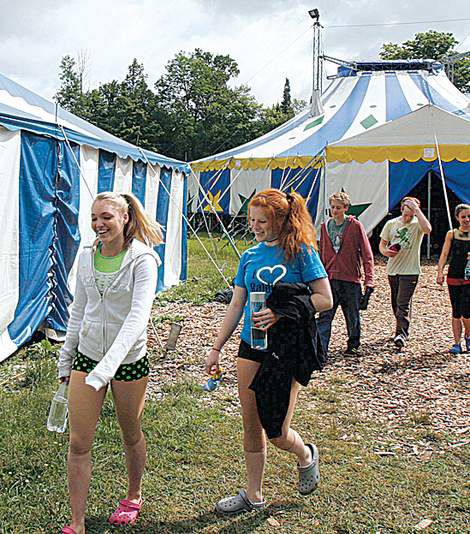Running off to join the circus (for the summer)
Published 5:00 am Friday, July 25, 2008

- Circus students walk past the one-ring big top to get to a class.
GREENSBORO, Vt. — Fourteen-year-old Thula Martin knows exactly what she’ll say if her teacher asks the class what they did this summer: “I ran away and joined the circus.”
She did, sort of: Thula, a ninth-grader from Pahoa, Hawaii, is one of 30 teenagers from around the world spending their summer performing in Circus Smirkus, a youth circus that barnstorms the Northeast each summer, showcasing school-aged acrobats, jugglers and clowns under a one-ring big top.
It’s not the greatest show on Earth, but it may be the youngest: Everyone in the ring is between 14 and 19 years old.
Each June, a new class of young entertainers shows up at the converted dairy farm with the blue-and-white circus tents, where veteran circus coaches get three weeks to build a show around them before they hit the road for a 71-date, two-month tour of New England and New York.
Founded by a former circus clown, it’s named after the comment made by his mother, after he ran off to join a circus at age 19 (“Circus, smirkus, get a job.”).
Rob Mermin decided other teens should have the same experience, and pitched his tents on an 8-acre hillside in northern Vermont. Twenty-one years later, Circus Smirkus still has ’em laughing in the aisles, and the circus business is full of its graduates.
“It’s intense, but it’s nice because you have all these other people doing the same thing as you, so it kind of pushes you to work harder and get better,” said Shea Vaccaro, 16, an acrobat and clown from Wilton, N.H. “And the coaches are great. They push you, but it’s to the good point.”
Up to 400 children a year apply for spots in Circus Smirkus, and the ones accepted pay $4,250 for the privilege. Most have been performing since they were toddlers.
All get the same treatment once they take rugged Circus Road through the woods to the grassy encampment at the end, where the center of operations is a ramshackle 180-year-old barn and farmhouse.
Living in beat-up trailers, a baton’s throw from the tents where they practice, the young entertainers help cook the food, wash their own plates and use a makeshift outhouse (marked with a hand-lettered “Super Trouper Pooper” sign) when nature calls.
They train under the tutelage of veteran circus performers and coaches, and abide by some strict rules. Use of alcohol or drugs is grounds for immediate dismissal, as is sex.
But most need little outside motivation to keep the clowning around where it belongs, according to Ed LeClair, the executive director.
“If you say, ‘You’re not in the ring next time,’ they’ll (ask), ‘How clean do you want these pots?’” he said.






